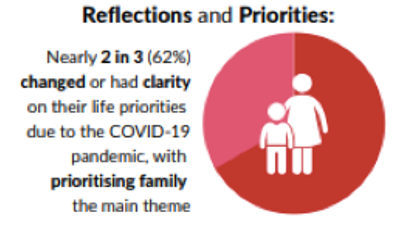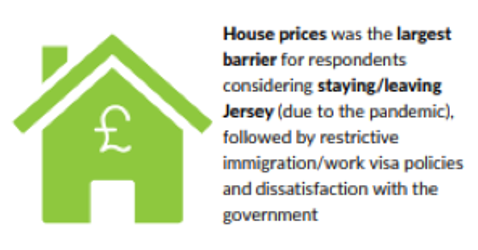
Part 1: What future do we want?
Wednesday 05 May 2021
This article starts with a very broad question - but one which is clearly absolutely central to our lives.
Giving bland answers such as heath or happiness to 'what future do we want?' is easy - it's much more difficult to drill down into actual, and specific, policies which islanders want to see introduced in Jersey.
With the elections next year, the Jersey Policy Forum (JPF) attempted to do just that in a survey, and the results were published in a report called 'The Future We Want' last week.
In a series of three articles beginning today, Express has asked Gailina Liew, the Executive Director of the JPF to set out their findings. Next year we all go to the polls to elect our next government - what will the candidates have to say about the following issues?
Part 1: Looking to the Future Survey
"This survey was conducted during the first wave of the pandemic and focused on gathering views in the following broad areas.
- How is the pandemic affecting your life and what are the implications for the future of Jersey?
- What do you think is important for Jersey's "new normal" to support a sustainable and resilient future for everyone in Jersey?
- What do you see as potential areas of success for Jersey in 30 years?
- How do you define the role of government and the social contract in Jersey?
In total, there were 30 questions and the several hundred people who completed the survey each invested an average of just over 40 minutes to share their views. The demographic profile of survey respondents largely reflected the population profile of Jersey with residents from all parishes, engaged in the full range of occupations, aged between 16 and 85, roughly equal numbers of male/female respondents with 40% born in Jersey and the remainder from the UK (42%) and elsewhere.



Change in total annual household income due to pandemic.
- No change or minimal impact 53%
- Substantial reduction (above 30%) 17%
- Some reduction (less than 10%) 16%
- Loss of all household income 3%
- Some or substantial increase 2%
Respondents’ most significant personal challenges reflected the following main themes.
- Uncertainty about the future
- Difficult work-life balance while in lockdown to juggle child-rearing, exercise and maintaining mental health
- Working from home and not being able to “turn off” work
- Lack of dedicated work space at home
- Exhaustion for parents working from home with child-care and home-schooling needs
- Not being able to travel or leave the island
- Not being able to see friends or family except with the use of technology like Zoom and FaceTime but “not the same as a hug”
- Concern about staying in touch and supporting elderly relatives and friends who do not have or are not comfortable with technology
- Concern about children’s well-being, educational prospects
- Cashflow and concerns about working/earnings post-pandemic
- Loss of household income and “burning through savings”
- Trying to remain positive, anxiety and “depression rearing its ugly head”
- Worry about how to run/manage/resume business activity after the pandemic
Personal changes prompted by pandemic experience included.
- Caring for the health and well-being of self and loved ones
- Enjoying and wanting to take better care of the environment
- Making working from home an essential option for work-life balance
- Re-aligning career to be more meaningful/beneficial to society/community
Opportunities and Challenges
Opportunities for Jersey to protect its natural environment and/or to strengthen its global reputation in this area were reflected in the following main themes expressed.
- Working from home as a norm
- Using lowered emission or emission-free transport
- Using sustainable energy sources
- Providing financial incentives
- Capping the population and limiting immigration
- Implementing island-wide policies and practices for recycling and waste disposal
- Repurposing existing buildings and land
- Looking to the Dutch example to make Jersey a “cycle-friendly” place
- 9% of respondents did not know or were unsure of how to answer the question
- 2% of respondents indicated that nothing should change or that nothing can be done
International challenges to Jersey’s economy were reflected in the following main themes expressed.
- Concern that tourism would be severely impacted and whether local tourism offering could be strengthened
- Important to safeguard Jersey as an international finance centre while also ensuring there is diversification to mitigate risk of putting “all our eggs in the finance basket”
- Some concern expressed about “being tempted to enter into questionable transactions/non-ethical financial solutions”
- Impact of global warming
- Impact of Brexit
- Concern about local economy and “silo” mentality and processes in government
- 18% of respondents did not know how or were unsure of how to answer the question
- 2% of respondents indicated that nothing should change
Government Financial Priorities
The government of Jersey could use a portion of its reserve funds and may borrow up to £500 million to pay for various support and economic stimulus programs as a result of the pandemic.
- 55% of respondents felt that government should replenish all reserve funds used due to the pandemic
- 64% of respondents felt that government should repay all debt taken on due to the pandemic
- The timeframes these respondents felt would be appropriate for government to replenish/repay were as set out in the below table.

Governments have used various methods to strengthen their financial positions. Respondents were asked to rate their preference for a range of options that the government of Jersey might need to consider. The proportion that gave a rating of 3 or higher (out of 5) to indicate a stronger preference is reported as follows:
- Increase economic activity 87%
- Reduce government expenditures 70%
- Maintain permanent sustainable level of debt 60%
- Sell government assets 60%
- Issue government bond 59%
- Raise charges/user fees 36%
- Raise taxes 34%



Desired Practices for 'New Normal'
The pandemic triggered many changes to how things are done and how public resources are used in Jersey. Respondents were asked to think about a 'new normal' after the pandemic and to rate the importance of continuing with specific practices. The proportion of respondents that scored 3 or higher (out of 5) for each practice indicated that it would be important to continue the following.
- Provision of lifeline income support for all who need it 88%
- Enhanced support for essential service providers and workers 87%
- Multi-skilled local workforce that can be shared across different sectors 81%
- Remote shopping and home delivery for goods/services sold in Jersey 81%
- Remote working as a normal way of working 80%
- Telehealth/online medical consultation 79%
- Cashless society (including tap ‘n go,' Apple Pay, digital currency, etc.) 73%
- Online delivery of educational curriculum 72%
- On-demand public transport 63%
Additional practices and changes desired reflected the following main themes.
- Fostering community spirit to maintain human connections as the world becomes more virtual.
- Online shopping and no contact delivery for all businesses and sectors.
- Government needs to focus on policies to address tax, housing prices, immigration and diversifying economy for the island.
- Government should not look to UK as benchmark as it is no longer world leader in many areas and Jersey is small so can be more progressive.
- Holistic delivery and planning in all sectors need to consider impact on well-being.
- Invest in Jersey as a cycling island.
- More affordable healthcare.

The questions and full results of the survey can be accessed at pages 8 and 17 of the JPF Briefing Pack 1 found here.
Read Part 2 tomorrow to learn more about specific policy objectives from islanders in The Future We Want.











